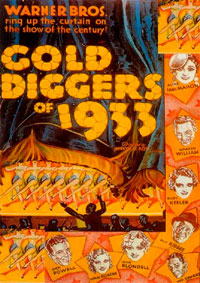 Gold Diggers of 1933 (1933) is a wonderful comedy in its own right made greater still by Busby Berkley choreographing & directing the big numbers. The songs composed by Al Dubin & Harry Warren are every one a gem.
Gold Diggers of 1933 (1933) is a wonderful comedy in its own right made greater still by Busby Berkley choreographing & directing the big numbers. The songs composed by Al Dubin & Harry Warren are every one a gem.
This was long my favorite classic musical after 42nd Street (1933). But having seen it so often throughout a past decade, back when repertoiry cinema houses were a commonplace in Seattle, I figured I'd seen it enough, & opportunities to see it on the Big Screen evaporated along with the film-revival repertoiry theaters.
But time takes so much away from the memory & I figured it was high time I experienced this film again, even if it now had to be from dvd. And zowwy did it hold up! So it'll stay right there on top of my favorites list.
Right off the bat there's the joy of Ginger Rogers singing "We're in the Money" throwing into the song a sweet moment of pig-latin, which was Ginger's own idea, a fabulous contribution to the film. And how much joy can a film deliver? Not much more than that!
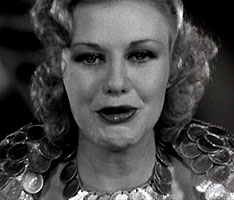 With chorus girls dressed like silver dollars in the hugely choreographed beginning, it feels like we're thrown right into the climax of many another musical that makes you wait until the end for anything this fabulous. With chorus girls dressed like silver dollars in the hugely choreographed beginning, it feels like we're thrown right into the climax of many another musical that makes you wait until the end for anything this fabulous.
Joan Bondell & Ruby Keeler add to the charm & glamour, as choras gals longing for personal stardom, thrilled to have a job in a big production. Alas, the show closes before it opens, as it's the Depression, & no one's in the money.
Three chorus girls -- Polly Parker (Ruby Keeler), Carol King (Joan Blondell) & Faye Fortune (Ginger Rogers), plus Trixie Lorraine (Aline MacMahon) the Fanny Brice-type commedienne, are sharing a small flat, living on bread & stolen milk.
Across the alley from their flat, in the next apartment house, they can see a perky happy-go-lucky novice song writer, Brad (Dick Powell).
He sings one of his newly minted tunes -- "Shadow Waltz" which will later be mounted hugely -- in order to woo & impress Polly: "In the winter let me bring the spring to you/ Let me feel that I mean everything to you..." & the film's romantic ingredient is now in play.
Barney Hopkins (delightful character actor Ned Sparks) has a new show in the works. When the girls hear of it, they're off. Barney is more than commonly eager to sign all four showgirls onto the project. And when he overhears a bit of "I've Got to Sing a Torch Song" from across the alley, he even hires Brad as the song writer.
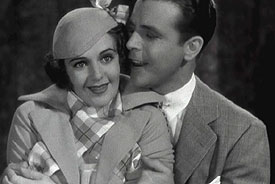 He's a good egg all round & wants the new show to do what musicals have been refusing to do, acknowledge the Depression. This is our first promise of that stunning number we'll eventually see wrought huge, "Remember My Forgotten Man." He's a good egg all round & wants the new show to do what musicals have been refusing to do, acknowledge the Depression. This is our first promise of that stunning number we'll eventually see wrought huge, "Remember My Forgotten Man."
Alas, Barney had not mentioned that he lacks a backer. He poses as hard-nosed & pragmatic, but he's a dreamer. Suddenly he has the seed of a cast & an eager young songwriter. But without investors, he doesn't really have a show.
Unexpectedly Brad comes up with enough money to get the costumes & rent the theater, jump-starting the new show, to be called "Forgotten Melody." As he has seemed like such a struggling writer barely getting by, his access to money is a mystery, & it'll turn out he's been living "under cover" so as not to embarrass his wealthy uppercrust family with his asperiations in the theatrical world.
When his brother Larry (Warren William) realizes Brad has fallen for a showgirl, he sets out to seduce Brad's beloved Polly to prove all show girls are merely gold diggers. The girls put in play a pretty ferocious swap, though, so that Larry begins sneaking around with Carol who he believes is Polly.
Carol pretends to be the very type of gold digger Larry expects, with the goal of punishing him for his misogyny & presumptions. Of course she totally falls for him, & how confused he'll be when he turns out not to have the iron willed ability to evade falling in love with her.
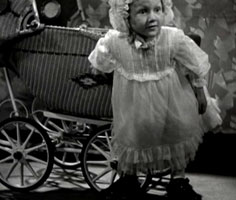 All the ingredients are stacked up in their proper places, headed for happy outcomes for all, & it's all terribly winning even before the main thing begins: The show. And what a show! All the ingredients are stacked up in their proper places, headed for happy outcomes for all, & it's all terribly winning even before the main thing begins: The show. And what a show!
The situations are legitimately funny, the love-interests authentically romantic, so that no part of the film is just waiting for the songs. It's all great. Most of the musical numbers, surprisingly enough, were added to the film as an afterthought, to make it more like the runaway-hit 42nd Street.
This is probably why the story is so strong since it was originally intended to stand on its own. Still, as a musical ultimately, it's about the songs, the dances, & the stage production, which must've been a little distressing for director Mervyn LeRoy who thought it was going to be his film, not Busby Berkley's.
Brad gets hornswoggled into the show & how just gosh darned cute he is in the big production for "Pettin' in the Park," a jaunty sweet risque song with Dick Powell singing & Ruby Keeler tapdancing.
Then it goes wildly Busby Berkley mass choreography through fabulous art deco sets, costuming as insane as it is beautiful, & a puckish midget (Billy Barty) posing just a little creepily as a child throughout.
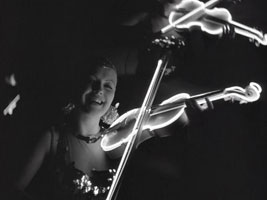 "Shadow Waltz" is also sung by Brad, then Polly joins in, building bit by bit to another huge production, with still more extreme art deco sets, & neon-light violins played by chorus girls. Could it get any better than this I wanna know! "Shadow Waltz" is also sung by Brad, then Polly joins in, building bit by bit to another huge production, with still more extreme art deco sets, & neon-light violins played by chorus girls. Could it get any better than this I wanna know!
And yes it can. "Remember My Forgotten Man" becomes one of the greatest musical numbers ever in cinema. It starts off as a simple nightmare of poverty & street life, with Carol playing the prostitute on a dark street who is kind to a homeless tramp (Billy West) who is a decorated war hero.
Blondell playing the bighearted hooker on stage does so with such strength of credibility & bitterness at a world gone wrong, she is just the right star for this scene, even though she was the only actress whose singing had to be dubbed.
Who is really singing for Joan was a longstanding mystery of cinematic history. That question was tackled jointly by Leonard Maltin, Rudy Behlmer, & Miles Kreuger, so that we now know it was nightclub & radio star Jean Cowan.
She starts the song off as a blues ballad that underscores lives ruined by war & poverty. Then Etta Moten enters the cast to pick up "Forgotten Man" as the purest of pure blues. Many have thought she was the one who dubbed Joan, though the voices sound nothing alike.
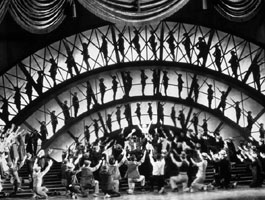 For reasons of racism Etta is sequestered from the rest of the cast in a window, & she doesn't even get credited as being in the film. For reasons of racism Etta is sequestered from the rest of the cast in a window, & she doesn't even get credited as being in the film.
But the mere acknowledgement of African Americans as part of the heroism & the suffering in the first world war & in Depression Era America is a rare, great moment for Hollywood Cinema on race.
Etta & her husband Claude Burnett founded the Negro Associated Press & Etta's singing career took a back-seat to their activism.
Sometimes she was able to mix the two, as in the 1942 revival of Porgy & Bess when she played Bess & induced Ira Gershwin to revise the word "nigger" out of the libretto, as she would under no circumstance sing that word.
The number builds with the horrifying beauty of marching soldiers, wounded soldiers, war heroes coming home emotionally or physically damaged, rewarded with joblessness & soup lines.
The choreography is worthy of a zombie movie, a powerful condemnation of society's failure. In a shocking artful & at the same time political choice, there is no happy-ever-after coda, & the audience is left with this final admonition.
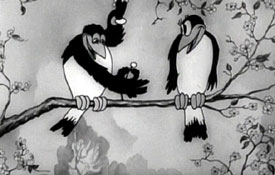 Birds & critters & people of the park do a rendition of the title song in Pettin' in the Park (1934), during a time of spring romance. Birdies in the trees smooch. A fat police officer sitting on a bench sneaks a kiss from a nanny. Various characters begin to sing the pleasing hit tune.
Birds & critters & people of the park do a rendition of the title song in Pettin' in the Park (1934), during a time of spring romance. Birdies in the trees smooch. A fat police officer sitting on a bench sneaks a kiss from a nanny. Various characters begin to sing the pleasing hit tune.
This Warner Brothers black & white Merrie Melodies episodes manages to work in midget gags that parody Billy Barty's performance in Gold Diggers of 1933. But Barty as the learing horny baby is a lot more disturbing than this baby talking with an adult voice.
Other than the unimaginative parody of Barty, few moments directly reference the movie sequence wherein this song was first introduced to the public by Ruby Keeler & Dick Powell. And halfway through, even the song disappears from the inspiration.
The second half is practically a different cartoon with no lingering references to love in spring. Waterfowl put on a water sports competition on a lake severely polluted with garbage, which someone seems to have thought would be funny. Polluted water sports takes up rest of the cartoon, without even a closing reference back to the titular number.
It's not one of the better Merrie Melodies, but through the first half when we hear the song, the song is great. Warner Brothers owned rights to the tunes from their movie musicals, which is why they were quick to recycle them into cartoons. This one was included amidst the extras in a six-disc dvd release of The Busby Berkley Collection (2006).
copyright © by Paghat the Ratgirl
|
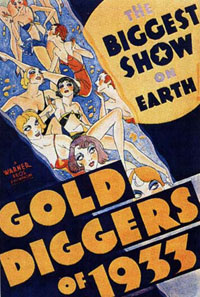

 With chorus girls dressed like silver dollars in the hugely choreographed beginning, it feels like we're thrown right into the climax of many another musical that makes you wait until the end for anything this fabulous.
With chorus girls dressed like silver dollars in the hugely choreographed beginning, it feels like we're thrown right into the climax of many another musical that makes you wait until the end for anything this fabulous. He's a good egg all round & wants the new show to do what musicals have been refusing to do, acknowledge the Depression. This is our first promise of that stunning number we'll eventually see wrought huge, "Remember My Forgotten Man."
He's a good egg all round & wants the new show to do what musicals have been refusing to do, acknowledge the Depression. This is our first promise of that stunning number we'll eventually see wrought huge, "Remember My Forgotten Man." All the ingredients are stacked up in their proper places, headed for happy outcomes for all, & it's all terribly winning even before the main thing begins: The show. And what a show!
All the ingredients are stacked up in their proper places, headed for happy outcomes for all, & it's all terribly winning even before the main thing begins: The show. And what a show! "Shadow Waltz" is also sung by Brad, then Polly joins in, building bit by bit to another huge production, with still more extreme art deco sets, & neon-light violins played by chorus girls. Could it get any better than this I wanna know!
"Shadow Waltz" is also sung by Brad, then Polly joins in, building bit by bit to another huge production, with still more extreme art deco sets, & neon-light violins played by chorus girls. Could it get any better than this I wanna know! For reasons of racism Etta is sequestered from the rest of the cast in a window, & she doesn't even get credited as being in the film.
For reasons of racism Etta is sequestered from the rest of the cast in a window, & she doesn't even get credited as being in the film.